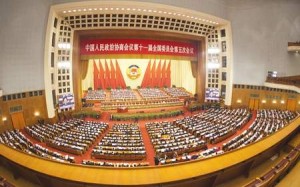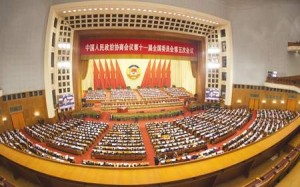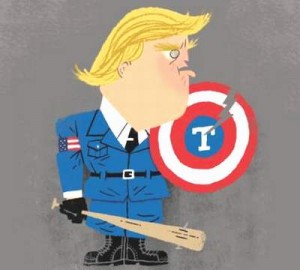Al Jazeera
Salvatore Babones
- China’s “moderately prosperous society” must be grounded in fiscal reality
 China’s rubber-stamp legislative assembly, the National People’s Congress, is meeting today to debate – or at least to discuss – China’s economic future. Gone are the days when China hoped to catch up to Europe or surpass the United States. The goal now is to create a “moderately prosperous society” that the country aims to build one by 2020.
China’s rubber-stamp legislative assembly, the National People’s Congress, is meeting today to debate – or at least to discuss – China’s economic future. Gone are the days when China hoped to catch up to Europe or surpass the United States. The goal now is to create a “moderately prosperous society” that the country aims to build one by 2020.
Building a moderately prosperous society – often defined in China as making it into the World Bank’s high-income country category – is the centrepiece of China’s 13th Five Year Plan. It also means providing a “fairly comfortable life for all,” a goal set by Deng Xiaoping nearly 50 ago.
Since then China has come a long way towards meeting this goal. But the 13th Five Year Plan – covering the years 2016-2020 – is crunch time for the Chinese economy. The current Communist Party of China (CPC) leadership – President Xi Jinping in particular – hopes to turn over a certified high-income country to its successors in 2022. This is Xi’s much-ballyhooed Chinese Dream.
The push is on. In a country that is mad about symbolism, the hope is that China will reach high-income status in time for the 100th anniversary of the founding of the CPC in 2021. But targets are much easier to set than to hit. Can China do it?
Finding the money
According to China’s own projections, meeting its economic goals will require the country to maintain 6.5 percent annual economic growth each year for the next five years. The Chinese economy supposedly grew by 6.9 percent in 2015, but this figure is getting harder and harder to believe in light of the dire economic news coming out of China. A hardened sceptic might argue that China’s economy isn’t growing at all.
Growth is the key target in the Five Year Plan, but China’s vision of a moderately prosperous society is about more than just relentless gross domestic product growth. It also embraces such noble goals as better jobs, universal healthcare, and an end to poverty. The growth figures are crucial for these goals, too, because building even a moderately prosperous society can put a severe strain on government budgets.
Chinese government spending is now rising much faster than government revenue, leading to a widening budget deficit. Without rapid GDP growth, China will find it very hard to pay the bills for its poverty reduction and other social goals.
Official sources are now mooting the possibility of a budget deficit in excess of four percent of GDP. The growing gap between China’s means and ends suggests it may soon be much larger than that.
Guns not butter
One spending priority in the Five Year Plan that may soak up even more money than China’s social goals is the modernisation of the People’s Liberation Army. The PLA is the ultimate force behind the regime and its leadership is used to getting double-digit annual budget increases. It has been suggested that this year’s increase may be as high as 20 percent.
With China actively challenging the US (as well as most of its neighbours) in a series of disputes in the South China Sea, it would be no surprise to see increases in the PLA budget. China is also in the midst of a major programme of weapons upgrades and acquisition. And just like many Western countries, China faces a rising tide of terrorist threats.
The problem for China is that it cannot afford double-digit military budget increases on a diet of single-digit GDP growth. The choice between guns and butter will come to a head in 2016 as the Chinese government reaches the limits of its borrowing capacity. With deficit spending already rising at an alarming rate, something will have to give – and soon.
Exacerbating China’s choice between guns and butter is the fact that its planned reform of the PLA will put some 300,000 soldiers out of work.
That’s small beans compared with the number who might be left unemployed by reforms to state industries expected to be included in the 2016-2020 Five Year Plan. One source suggests that as many as three million workers could be laid off in the drive to improve economic efficiency. While such a high figure is probably politically unrealistic, it does illustrate the conundrum facing Chinese policymakers.
The fundamental problem is that without double-digit GDP growth, the 13th Five Year Plan of 2016-2020 is more of a wish list than a true roadmap to a moderately prosperous society. With the economy growing more slowly (if at all) the Chinese government will have to raise additional tax revenues to have any hope of meeting its ambitious social – and military – objectives.
China’s Premier Li Keqiang has said that in 2016, the Year of the Monkey, he will wield the mythical monkey’s gold-banded cudgel to smash all obstacles that stand in the way of China’s economic targets.
The weapon he might find more useful is an effective progressive income tax. The social and economic agenda that China has laid out for 2016-2020 is the right one. The challenge now is to find a way to pay for it.




